PBS NOVA Film Crew at DePauw for Biography of Percy L. Julian '20
May 24, 2002
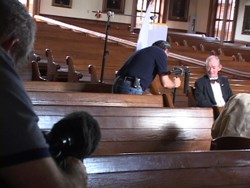 May 24, 2002, Greencastle, Ind. -
May 24, 2002, Greencastle, Ind. - ![]() [DOWNLOAD AUDIO: "DePauw & Percy Julian" 379KB] "DePauw played a very significant role in Percy Julian's life at several different points," says Steve Lyons, co-producer and writer of an upcoming two-hour NOVA profile of the legendary chemist and 1920 graduate of DePauw University. Lyons and his colleagues are in Meharry Hall of historic East College today, videotaping interviews with professor emeritus of chemistry Donald "Jack" Cook and his wife, Marion, who were friends with Dr. Julian and still communicate with his family, and Wesley J. Lyda, a 1935 DePauw graduate who studied under Julian. The PBS program will likely air in January 2005.
[DOWNLOAD AUDIO: "DePauw & Percy Julian" 379KB] "DePauw played a very significant role in Percy Julian's life at several different points," says Steve Lyons, co-producer and writer of an upcoming two-hour NOVA profile of the legendary chemist and 1920 graduate of DePauw University. Lyons and his colleagues are in Meharry Hall of historic East College today, videotaping interviews with professor emeritus of chemistry Donald "Jack" Cook and his wife, Marion, who were friends with Dr. Julian and still communicate with his family, and Wesley J. Lyda, a 1935 DePauw graduate who studied under Julian. The PBS program will likely air in January 2005.
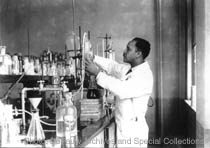 "Of course, [Julian] was an undergraduate here, got interested in chemistry under [Professor] William Blanchard, then came back as a research associate in his thirties and made his name in chemistry by synthesizing physostigmine [which allowed affordable treatment of glaucoma]," Lyons added. "Those are the two key episodes in his life involving DePauw in his life, and we want to make sure that those are part of the film."
"Of course, [Julian] was an undergraduate here, got interested in chemistry under [Professor] William Blanchard, then came back as a research associate in his thirties and made his name in chemistry by synthesizing physostigmine [which allowed affordable treatment of glaucoma]," Lyons added. "Those are the two key episodes in his life involving DePauw in his life, and we want to make sure that those are part of the film."
The profile of Dr. Julian will be part of NOVA's "Lives in Science Project," which use interviews and an actor to tell the story of great scientists. 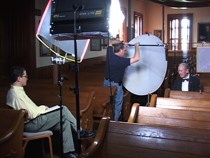 The project began with a biography of Albert Einstein. In seaching for other great scientists to profile, NOVA
The project began with a biography of Albert Einstein. In seaching for other great scientists to profile, NOVA ![]() [DOWNLOAD VIDEO: "A Story To Do" 400KB] "discovered the Percy Julian story, which we didn't know about before then, and decided that was a story to do," Lyons says. "We've spent the last year and a half digging into Percy Julian's life in a way that no one has before." (BONUS CLIP:
[DOWNLOAD VIDEO: "A Story To Do" 400KB] "discovered the Percy Julian story, which we didn't know about before then, and decided that was a story to do," Lyons says. "We've spent the last year and a half digging into Percy Julian's life in a way that no one has before." (BONUS CLIP: ![]() [DOWNLOAD AUDIO: "More on The Film" 606KB])
[DOWNLOAD AUDIO: "More on The Film" 606KB])
Of the Cooks (Jack Cook is seen at left), Lyons says, ![]() [DOWNLOAD VIDEO: "DePauw Storyteller" 172KB] "We're hoping
[DOWNLOAD VIDEO: "DePauw Storyteller" 172KB] "We're hoping 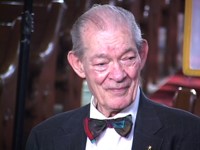 [they] can be our DePauw storytellers, in a way." The crew also interviewed Wesley Lyda (seen below at right), who was a student during the period when Percy Julian was a research associate at DePauw and directed the research of senior chemistry majors. Lyda recalled how, on the night that Julian successfully completed synthesis of the drug physostigmine in the DePauw lab, Julian knocked on his room door at midnight to wake him and talk chemistry for most of the rest of the night. The NOVA crew will return to Greencastle at a later date with film equipment to get footage of the DePauw campus
[they] can be our DePauw storytellers, in a way." The crew also interviewed Wesley Lyda (seen below at right), who was a student during the period when Percy Julian was a research associate at DePauw and directed the research of senior chemistry majors. Lyda recalled how, on the night that Julian successfully completed synthesis of the drug physostigmine in the DePauw lab, Julian knocked on his room door at midnight to wake him and talk chemistry for most of the rest of the night. The NOVA crew will return to Greencastle at a later date with film equipment to get footage of the DePauw campus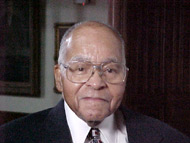 .
.
"Percy Lavon Julian was born April 11, 1899 in Montgomery, Alabama to Elizabeth Lena Adams Julian and James Sumner Julian, a railway mail clerk," the DePauw University Archives biographical sketch of Dr. Julian states. "He graduated from the State Normal School for Negroes, a private institution in Montgomery, and was admitted to DePauw University in 1916. While at DePauw, Julian was elected to Phi Beta Kappa and Sigma Xi and graduated in 1920 with honors. Following graduation, Julian taught at Fisk University in Nashville, Tennessee, West Virginia State College and Howard University. Julian then went to 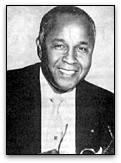 Austria where he received a Ph.D. from the University of Vienna in 1931. He then returned to his alma mater as a research fellow in organic chemistry until 1936."
Austria where he received a Ph.D. from the University of Vienna in 1931. He then returned to his alma mater as a research fellow in organic chemistry until 1936."
Percy Julian later served as director of research for the Glidden Company of Chicago, and later founded the Julian Research Institute. His research led to discoveries in the manufacture of drugs, hormones, vitamins, amino acids, paint and paper, yielding over 100 patents, including a synthetic cortisone called Compound S, and the means of producing two synthetic hormones, testosterone and progesterone. During his lifetime, Julian received fifteen honorary degrees and numerous awards and citations, authored and co-authored more than 160 publications, and was a trustee of five universities, including DePauw. Dr. Julian died in Waukegan, Illinois in 1975.
Back